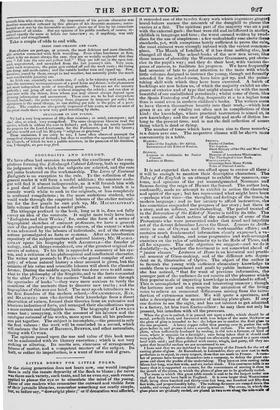ZOOLOGISTS AND ZOOLOGY.
We have often had occasion to remark the excellence of the com- pilations forming the Edinburgh Cabinet Library, both as regards the judgment with which the subjects are selected, and the care and pains bestowed on the workmanship. The Lives of Eminent Zoologists is no exception to the rule. To the collection of the general reader it will form a useful addition ; the amateur zoolo- gist will find it almost indispensable, as it will furnish him with a good deal of information he should possess, but which it is scarcely worth while to seek in the originals, or less completely in scattered compilations ; to the more ambitious student, who would wade through the empirical labours of the earlier natural- ists for the few pearls he can pick up, Mr. MACGILLIVRAY'S little volume will be found a useful guide.
The titlepage prefixed to the book, long as it is, does not fully convey an idea of the contents. It might more truly have been "Zoologists and their Works ;" for, under the form of a series of biographical sketches of eminent professors, we have a general view of the gradual progress of the science, of the extent to which it was advanced by the labours of individuals, and of the strange notions promulgated as facts or systems. After an introduction expository of the subject-matters of natural history, Mr. M AC 0 I L- LIVRAN opens his biography with ARISTOTLE—the founder of zoology, and, all things considered, one of the greatest original ob- servers of nature. To his life is appended a summary of his sys- tem, and a criticism of his philosophical and intellectual character. The writer next proceeds to PLINY—the grand compiler of anti- quity; of whose natural history a clear account is given, but the estimate of his value and scientific labours will shock the classical devotee. During the middle ages, little was done save to add some- what to the philosophy of the Stagirite, and to the facts connected by the elder PLINY : for the authors "looked at nature through the spectacles of books "—they were more anxious to verify the assertions of the ancients than to discover new truths ; and the biographies of this sem are brief. The next epoch introduces us to the first founders of the modern school,—SWAMMERDAM, RAY, and REAummt; men who derived their knowledge from a direct observation of nature, formed their theories from an extensive and laborious induction of facts, and arranged their classifications upon a more certain and intelligible basis. The biography of LINN/Ens comes last ; occupying, with the account of his labours and the catalogue raisonne of his works, more space than all his predeces- sors put together. The subject is incomplete,—the present is only the first volume : the work will be concluded in a second, which will embrace the lives of BRISSON, BUFFON, and other naturalists, Closing with CUVIER.
The opinion passed upon the use and value of this book must not be confounded with its literary execution ; which is not very striking or alluring. Its merits are, clearness of arrangement, fulness of matter, and a competent mastery of the subject. Its fault, or rather its imperfection, is a want of force and of grace.






















 Previous page
Previous page